Social Policy
Course Summary:
The course Social Policy, part of the one-year Master in Economics, entails a variety of learning activities. In the first part of the course, lectures focus on subject-specific content regarding the welfare state and well-being. Next, there are workshops on presentation competences and communication skills, necessary for the following part of the course. Students then work in smaller groups on two sequential problem-based learning cases, resulting in (1) a group paper and (2) a try-out and final presentation. Finally, the course ends with two real-life perspectives on social policy during a guest lecture and visit to the European Commission.
Course Design:
Challenges of a Welfare State 
The course provides students with insights into government intervention in a modern 'welfare state' and the concept of 'well-being.' It encourages critical thinking about challenges faced by welfare states and policy options. The emphasis is on acquiring and integrating basic knowledge through lectures and theme classes, while also developing skills: (1) course specific skills (such as gaining insight into the current challenges of our welfare state), (2) learning skills with which students organize their knowledge-gathering process and (3) social, reflective, critical thinking and communicative skills to maximally prepare students for their future careers (e.g. presentation and job application). These skills are used during problem-based learning in which students solve practical cases in small groups.
During the first phase, students address the question of socio-economic policies for a beneficial marriage between the fourth industrial revolution and inclusive growth. In heterogeneous groups of 4 to 5 students, students prepare individually and have a tutorial meeting with assigned roles of discussion leader and secretary. During this process they are guided both on the content and on the learning process. The result of the process is (for each group) a paper on a topic related to the fourth industrial revolution and inclusive growth.
Well-being in a Welfare State
The second phase focuses on the topic of well-being and is introduced with a Q&A. In this phase, students work in heterogeneous groups of 2 to 3 students to prepare a presentation about a specific well-being domain, including indicators and policy proposals, using OECD “Better Life” information. Students deliver a try-out and a final group presentation, receiving individual feedback on communication and group feedback on content after each session.
Contact Person
Prof. Dr. Elsy Verhofstadt -
